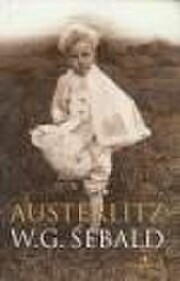

Click on a thumbnail to go to Google Books.
|
Loading... Austerlitz (original 2001; edition 2001)by W. G. Sebald (Author)
Work InformationAusterlitz by W. G. Sebald (2001)
 » 25 more German Literature (71) Top Five Books of 2013 (1,549) 501 Must-Read Books (287) 2000s decade (44) Books Read in 2021 (4,294) Read These Too (101) Overdue Podcast (503) Holocaust (70) 1,001 BYMRBYD Concensus (717) Best of World Literature (273) No current Talk conversations about this book.  3.5 rounded up. This is good, but I feel like for how dry it is it might as well have been straight biography. If you're going to take the liberty of making people up in real events, make them a bit more lively, or interesting at least? This is still delivering an important snippet of history, and there were several lines of genius writing, so I'm not surprised it's well loved. A friend of mine lent me this book, ostensibly because she no longer wanted a visible reminder of having had to write an essay about it in her undergraduate days. Her copy had circles around every reference to white or black, which emphasised to me how little colour is mentioned throughout. The novel is quite rich with description, but it’s as monochrome as the photographs scattered through the text. I am somewhat embarrassed that, despite having read a Sebald novel before, it took me 148 pages to notice that there were no paragraph breaks. Indeed, at one point I realised that the sentence I was reading had lasted for an incredible 12 pages. Despite this, and the lack of speech marks, I found ‘Austerlitz’ very digestible. Perhaps too much so, in fact. I had to reread the odd page having realised I’d skimmed over it so quickly that I hadn’t the faintest idea what it had contained. I like Sebald’s stream-of-consciousness travelogue style, although I think I preferred [b:The Rings of Saturn|434903|The Rings of Saturn|W.G. Sebald|https://images.gr-assets.com/books/1386921954s/434903.jpg|17952027]. I found all the business with fortresses and their inevitably becoming obsolete rather fascinating. The air of melancholy was evoked very effectively, although I expected more focus on the aftermath of the Second World War. Initially this was not the case, although latter half of the novel picked it up. It was foolish to expect focus from a Sebald novel, though, they are diffuse, digressive, and indirect. Also very beautifully written. Our anonymous narrator transcribes the extraordinarily articulate narration of Austerlitz, a refugee adopted as a young child in Wales in the early part of WW2. Austerlitz only learns of his origins, and only vaguely, when his last parent dies. As he tells his story to our narrator, we learn of his despair and inability to be close to anyone or anything, and his search for his past. Star shaped buildings and stars themselves play a role that I didn’t quite grasp. As Austerlitz slowly pieces together his past we learn of the holocaust and the complicity of peoples across Europe in its execution. This was related, but very distinct to the two other novels by Sebald I’ve read, Rings of Saturn and Vertigo. Both of those were essentially travelogs where you learn about the nature of memory from tales of the past rooted in the present. Austerlitz shared some elements, such as the nature of memory, but the third party narration makes it less like you are hearing Sebald in your head, with its wonderful quirkiness. It is excellent, and heartbreaking, but not quite as good as the other two.
He is one of the most gripping writers imaginable. It's not the story so much that takes hold of the reader: it's the descriptions and the meditations, which can be hallucinatory in their effect. This is true of all his books, but in Austerlitz the proportion of rumination and evocation to narrative is larger than ever. Sebald zeigt sich auf der epischen Langstrecke als großer Erzähler, denn mit "Austerlitz" hat er sich selbst übertroffen und ein Wunderwerk an unvergesslicher Prosa geschaffen. Wenn Austerlitz gegen Ende meint, von ihm werde nichts bleiben als ein Stapel Photographien, so hat ihn in diesem Punkt sein sonst so untrügliches Gespür zum Glück doch getäuscht. Denn Sebald ist es gelungen, Austerlitz hinüberzuerzählen und zu retten in ein bleibendes Stück Literatur, das der Vergänglichkeit trotzt. Belongs to Publisher SeriesGli Adelphi [Adelphi] (281) Keltainen kirjasto (345) Keltainen pokkari (50) ContainsAwardsDistinctionsNotable Lists
"Austerlitz is the story of a man's search for the answer to his life's central riddle. A small child when he comes to England on a Kindertransport in the summer of 1939, Jacques Austerlitz is told nothing of his real family by the Welsh Methodist minister and his wife who raise him. When he is a much older man, fleeting memories return to him, and obeying an instinct he only dimly understands, Austerlitz follows their trail back to the world he left behind a half century before. There, faced with the void at the heart of twentieth-century Europe, he struggles to rescue his heritage from oblivion."--P. [2] of cover. No library descriptions found. |
Current DiscussionsNonePopular covers
 Google Books — Loading... Google Books — Loading...GenresMelvil Decimal System (DDC)833.914Literature German & related literatures German fiction 1900- 1900-1990 1945-1990LC ClassificationRatingAverage: (4.15) (4.15)
|
|||||||||||||||||||||||||||||||||||||||||||||||||||||||||||||||||||||||||||||||||||||||||||||||||||||||||||||||||||||||||||||||||||||||||||